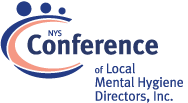
Advancing Public Policies for People with Mental Illness, Chemical Dependency or Developmental Disabilities
|
|
 |
|
Depressed? Here's a Bench. Talk to Me.

The city is taking this problem seriously, mainly through the efforts of ThriveNYC, a program founded by Mayor Bill de Blasio's wife, Chirlane McCray. Perhaps the most curious effort involves giant orange Lego-style blocks on the sidewalk outside agencies called Neighborhood Health Action Centers in the Tremont section of the Bronx, East Harlem, and Brownsville in Brooklyn. Read more
here.
|
|
 |
|
|
 |
|
|
Addressing Social Determinants: Impacting Health & Wellness Beyond Traditional Medicine (SDOH Series Part 1)
July 29, 12 - 1 pm, PsychU
Accessing Housing: Overcoming the Documentation Barrier
July 29, 1 - 2 pm, The National Center for Complex Health and Social Needs
PSYCKES Brief Clinical Summary
July 30, 10 - 11 am, OMH
The Intersection of Substance Use Disorders, Opioid Misuse, Overdose, and Suicide: Understanding the Connection, Part 1
July 30, 11 am - 12 pm, SAMHSA PTTC
HIPAA/Data and Information Sharing
July 30, 1:30 - 3 pm, SAMHSA's GAINS Center
Strategies for Connecting Justice Involved Populations to Substance Use Disorder Treatment Webinar
July 30, 2:30 - 3:30 pm, CMS Medicaid Innovation Accelerator Program
Integrating DBT Skills in LGBTQ Affirmative Psychotherapy with Adolescents and Adults
July 31, 12 - 1 pm, MCTAC
PSYCKES Mobile App for iPhones & iPads
July 31, 3 - 4 pm, OMH
The Developmentally Informed and Trauma-Informed Police Officer
August 1, 1 - 2 pm, Office of Juvenile Justice and Delinquency Prevention
Implementing MAT in Drug Court Settings
August 5, 2 - 3:30 pm, SAMHSA's GAINS Center
The Trauma Informed Family Peer Advocate
August 7, 1 - 2 pm, MCTAC
Demonstrating the Impact of Supportive Housing Webinar
August 7, 2 - 3:30 pm, CMS Medicaid Innovation Accelerator Program
Using PSYCKES Recipient Search
August 7, 3 - 4 pm, OMH
Widening the Lens: Treatment for Alcohol and Stimulant Use Disorders Webinar
August 8, 3 - 4:30 pm, CMS Medicaid Innovation Accelerator Program
Using PSYCKES for Clinicians
August 13, 1 - 2:30 pm, OMH
HCBS Training Series: Balancing Choice and Risk
August 14, 1:30 - 3 pm, Center for Medicaid and CHIP Services
PSYCKES Brief Clinical Summary
August 15, 3 - 4 pm, OMH
Effective Early Diversion Follow-up for Engaging Individuals in Services and Recovery
August 19, 1 - 2 pm, SAMHSA's GAINS Center
Enable Access to Client-Level Data in PSYCKES
August 20, 11 am - 12 pm, OMH
How To Build Effective Programs That Meet Payers' Focus On Social Determinants Of Health: Will The New Codes Pave The Way? (SDoH Series Part 2)
August 20, 12 - 1 pm, PsychU
PSYCKES Access and Implementation
August 29, 2 - 3 pm, OMH |
|
 |
|

|
CLMHD BH Portal Webinar: Other Resources - Kids Well-being Indicators Clearinghouse
August 14: 12 - 12:30 pm, GTM
Children & Families Committee Meeting
August 20, 11:30 am - 1 pm, GTM
CLMHD BH Portal Webinar: Other Resources - Behavioral Risk Factor Surveillance System (BRFSS)
August 28: 12 - 12:30 pm, GTM
Contact CLMHD for all Call In and Go To Meeting information, 518.462.9422
|
|
|
|
Lifesaving Opioid ER Treatment Born in Buffalo to Go Statewide

For the last two decades, almost all patients brought into a Western New York emergency room after an opioid drug overdose were stabilized, given a short list of treatment clinics to call for a follow-up appointment, and then released.
The results were predictable. Few appointments were scheduled, and the potentially fatal cycle of drug addiction continued.
That began to change two years ago, when Dr. Joshua Lynch went on a regionwide crusade to bring together those on the front lines of the opioid crisis.
Health care providers in 17 ERs now treat those suffering from an overdose, or in withdrawal, on a short course of appropriate medication, then provide them the chance to make a guaranteed appointment - within two days - at one 47 drug treatment clinics across the region.
The process has shown such promise that the state Department of Health will announce on Wednesday that it will launch the Buffalo Medication Assisted Treatment and Emergency Referrals, or Buffalo MATTERS, program across New York. Read more
here.
|
|
 |
|
Opioid Crisis: 3.34B Pain Pills Flooded New York In 7 Years
The news from the federal government that drug overdose deaths in the United States declined in 2018 for the first time in three decades comes just as a new report published by The Washington Post shows the staggering number of opioid pills that flooded the country and contributed to the opioid crisis.
According to the data published by The Post, 76 billion oxycodone and hydrocodone pills were distributed across the country between 2006-2012. The figures come from a DEA database that The Post and The Charleston Gazette-Mail sued to obtain. A judge in Cleveland overseeing a combined lawsuit from cities across the country against drug companies granted the newspapers partial access to the database following an appeal.
The Post also published the figures showing how many pain pills reached individual states and counties.
In New York, 3.34 billion prescription pain pills were distributed between 2006-2012. Read more here.
|
|
 |
|
|
Can Medication-Assisted Treatment Repair Damage Caused By Drug Use?
Over the past few years medication-assisted treatment (MAT)
has become the standard of care for people with opioid use disorder, helping to cut users' risk of fatal overdose by as much as half.
Now, researchers from the National Institute on Drug Abuse (NIDA) are hoping to understand why.
NIDA director, Dr. Nora Volkow, has a theory. She believes that medications including methadone, buprenorphine and naltrexone don't just help people deal with cravings for drugs. She thinks these medications also help repair the damage done to the brain by drug use,
the AP reported. Read more
here.
|
|
 |
|
|
Funding Opportunity: Improving Access to Opioid Use Disorder Treatment and Recovery Services for Underserved Populations and Communities
The Foundation for Opioid Response Efforts (FORE) is offering grants for improving access to evidence-based opioid use disorder (OUD) treatment and recovery services for vulnerable and high-risk populations, with an emphasis on removing barriers and improving access to and quality of medication-assisted treatment (MAT) for underserved populations.
FORE is specifically interested in projects that aim to improve and reform the continuum of care, provide wraparound social services, and address other areas that are necessary to facilitate access to high-quality, patient-centered treatment and improve outcomes.
Application deadline is August 25, 2019. Eligible applicants include 501(c)(3) public charities, state governments, and local government agencies. Read more
here.
|
|
 |
|
|
Senate Majority Announces Statewide Hearings And Roundtable Discussions On Opioids, Addiction & Overdose Prevention
Senate Majority Leader Andrea Stewart-Cousins this week announced that the Joint Senate Task Force on Opioids, Addiction & Overdose Prevention will be holding seven hearings and roundtable discussions across the state. The Task Force will carry out a holistic review of New York's overdose crisis and the State's approach to drug use, with a focus on saving lives and improving individual and community health. The Task Force will hold discussions with stakeholders and carry out a review of best practices to identify gaps in the current system and to develop short- and long-term legislative and budgetary solutions. The first hearing will take place on August 9 in the Bronx, with subsequent hearings and roundtables taking place in Central New York, Buffalo, Staten Island, the Hudson Valley, Long Island, and Albany. Read more
here.
|
|
 |
|
Report to Congress: Strategies to Provide Housing Related Supports, Services & Care Coordination Services to Individuals with Substance Use Disorder
This week the Centers for Medicare & Medicaid Services (CMS) published a
Report to Congress detailing the Action Plan to carry out the requirements of Section 1018(a) of the SUPPORT for Patients and Communities Act. The Action Plan includes technical assistance and support to states in developing and expanding innovative state strategies, highlighting available options under Medicaid (including through state Medicaid demonstration projects) to provide housing-related supports and services and care coordination services to individuals with substance use disorders.
|
|
 |
|
Why Technology is Essential to Community Health Partnerships, SDOH

With the industry's growing awareness that the social determinants of health have a considerable impact on patient health, more organizations are leaning on community health partnerships to address patient needs.
But bringing together those multiple stakeholders can be challenging, especially when an organization has no digital mechanism to back it up, found Ellie Zuehlke, the director of Community Benefit & Engagement at Allina Health.
"To make things feasible in a large healthcare system, across all of these different sites, with different staff, using different resources, technology is a really important piece," Zuehlke told PatientEngagementHIT.com in a recent interview.
And that technology piece becomes even more important considering Allina Health is an Accountable Health Communities model
participant. The program, launched by CMS in 2017, aims to understand how healthcare organizations can address the social determinants of health in high-needs patients. Read more here.
|
|
 |
|
Two Possible Opportunities In The Shift In Primary Care

If you're not "connecting the dots" between primary care and specialty health care services, I'm not surprised. Traditionally, these two health care service domains have not had great intersection. But, that has changed over the past decade with primary care-medical homes, in particular-serving as the coordinator of all care in a much more formal way. In the wake of that changing role in the health care value chain, it is not surprising we're seeing new models for financing and the delivery of primary care arise.
The two developments of the past quarter in this area come from completely different perspectives-the private market and the federal government.The two developments of the past quarter in this area come from completely different perspectives - the private market and the federal government. First, CVS is planning to expand its HealthHUB® model. This new CVS model will expand its retail health footprint with chronic care management, telehealth, and more. Second, the Centers for Medicare & Medicaid Services (CMS) announced the new "Primary Cares Initiative". CMS has outlined plans to use flat fees, population-based payments, and capitation to deliver primary care to Medicare fee-for-service enrollees.
What these two developments tell us is that the reshaping of primary care is happening from all angles-and they will have major implications for consumers, and present new threats and opportunities for provider organizations. Read more here.
|
|
|